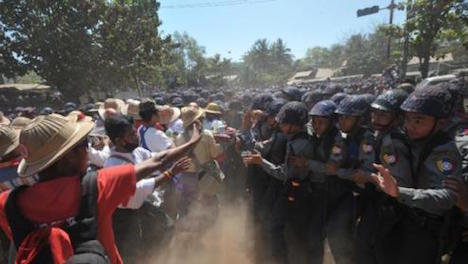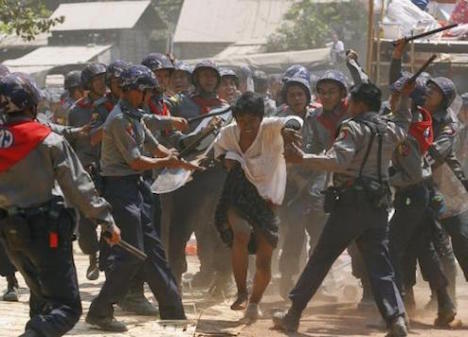Myanmar’s Cyclonic Government Is Like Violent Nargis
 Print This Print This
By Dallas Darling
Submitted by Author
Monday, Mar 16, 2015
Like Cyclone Nargis which struck down its victims in 2008, students, monks, and journalists never had a chance. Beaten and detained by Myanmar’s cyclonic police force, over 200 of them were arrested, their aspirations destroyed. They had simply gathered to protest an education bill that limited academic independence and freedom of thought.
On the night of May 2, 2008, Myanmar’s sullen calm was also suddenly interrupted. A twenty-foot surge of sea water destroyed low-lying villages of the Irrawaddy Delta, where four million villagers had settled to work the rich soil. Further inland, 120 mile and hour winds flattened homes and buildings, killing an estimated 140,000 people.
Resembling the bodies that lay crushed in homes and buildings, the National Network for Education Reform’s goals and dreams have been repeatedly trampled by Myanmar’s military junta. Though the government had promised to negotiate with protesters, they were met with a disproportionate amount of force: 1,000 police officers.
 |
| Students confronting police - March 2015 |
Cyclone Nargis also imposed its devastating force. Entire villages and towns were completely leveled. But the greatest tragedy was how the military junta responded. More paranoid about being overthrown, they remained deeply obstructive towards overseas aid teams.[1] Supply planes and ships, even aid workers and reporters, were denied entry.
Despite ongoing hunger and homelessness, Myanmar’s government continued to barrage its people with propaganda: the army sticking its own labels on donated food packages from other nations. Emergency relief programs complained that only one-fifth of the aid had reached the people. The government-controlled press claimed all were being helped.
 |
| Police respond to students protests with beatings - March 2015 |
Several student protesters who escaped the police beatings eventually found refuge in a Buddhist temple, at least for a short time. Like those who sought food and medicines in Buddhist monasteries after Cyclone Nargis’ devastation, they too were viciously attacked by the military regime-now calling itself a semi-civilian reform government.
Yangon, where the student protest and beatings occurred, has been the site of numerous student-led demonstrations. In 1988, demonstrators ignited Myanmar’s pro-democracy movement, spreading throughout the country before being brutally suppressed. Natural disasters are to be expected, but not unnatural ones caused by brutal institutions.
Right after Cyclone Nargis, Myanmar’s regime forced a referendum on a new constitution designed to entrench the junta. Despite millions of people in shock, the military regime got a 93 per cent vote in favor of its new constitution. Myanmar’s social contract became a permanent military contract, namely against the oppressed and political opponents.
Journalists trying to reach the delta found themselves confronted by a barbed-wire barrier at a military checkpoint. How long will journalists, which were covering the protests and police beatings, remain behind barbed-wire barriers? How much more military aid will nations like China and the U.S. send to help prop up a “monopoly of violence”?
Nobel Peace Prize winner Aung San Suu Kyi and the National League for Democracy condemned the cyclonic violence, demanding an inquiry into the police beatings. Rafida Bonya Ahmed, wife of an American blogger who was recently hacked to death while police stood by, also demanded justice and “to stop an illegal culture of impunity.”[2]
Even though political interaction between different peoples is ultimately a struggle for power, it should never consist of unaccountable power, or systematic terror. When governments exists to maintain only their self-interests, such governments become destructive. Whether natural or unnatural forces, people never forget cyclonic rifts.
Myanmar’s national anthem, “Until The World Ends,” contains these words: “Where prevail justice and independence…It’s our country…our land. Where prevail equal rights and correct policies…For people to lead a peaceful life…It’s our country…our land.” Until these ideals are established, stormy conflicts will be the inevitable consequences.
The victims of both Nargis and Myanmar’s cyclonic government are still searching for justice and independence to prevail, including equal rights and correct policies.
NOTES:
[1]
Withington, John. Disaster! A History of Earthquakes, Floods, Plagues,
and Other Catastrophes. New York, New York: Skyhorse Publishing Company,
2010., p. 89.
[2] www.reuters.com. “Bangladesh Police Stood Close by
During U.S. Blogger Attack: Victim’s Wife” by Serajul Quadir. March 11,
2015.
Dallas Darling is the author of: Politics 501: An A-Z Reading on Conscientious Political Thought and Action; Some Nations Above God: 52 Weekly Reflections On Modern-Day Imperialism, Militarism, And Consumerism in the Context of John‘s Apocalyptic Vision; and The Other Side Of Christianity: Reflections on Faith, Politics, Spirituality, History, and Peace. He is a correspondent for www.worldnews.com.
|
 Print This Print This

|

